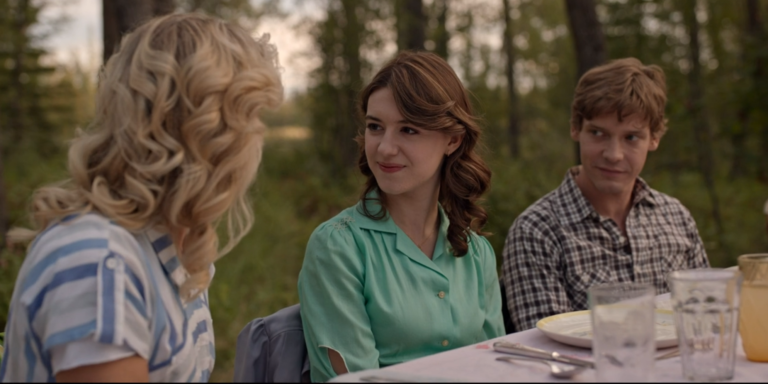Research project on why people leave the Church should also explore reconciliation
My mind began whirling when Jana Reiss announced she and her research partner Benjamin Knoll were launching an in-depth project to see why Mormons leave and have left the Church. (See here for the Kickstarter announcement). It’s an expansion of her 2019 book focusing on how millennials’ more inclusive ideals are causing them, at great personal anguish, to leave the fold.
I want to know how similar exMos’ reasons for leaving are similar to active Mormons’ reasons for staying: a culture and community that fits them, alignment with beliefs, union with friends and family.
This captures the dynamic perfectly:
–Can there be an inverse survey on “why I stay?” In a 2013 collection of essays under that name, no one reported staying because the Church had a monopoly on ‘whole truth.’ They describe the joy of having a community wherever you go (Claudia Bushman), of making a human institution more humane (Armand L Mauss), of seeing the world ‘Mormonly’ and of loving the doctrines of free agency and eternal progression (Lavinia Fielding Anderson). All this resonates. And yet, the Church no longer feels like my church.
–Can ‘leaving’ be pinned to a single point in time? How do people define their ‘in the Church’ and ‘after the Church’ lives?
–What traps Mormons into staying after they know it’s not working? One of the least happy times in my life was my senior year in college. I’d stopped believing in the Church (almost) but kept attending because I represented Mormonism on my campus faith committee and didn’t want people to think badly of the Church. I didn’t want to risk costing someone else their salvation. How much worse is it for prominent Mormons? How many people can be as brave as Josh Weed, once touted as an example of mixed-orientation marriage and now happily married to a man? (For link and reflections on his amazing podcast with Hazard Rowe, see here)
–Do reasons to leave vary by age and gender? The younger you leave, the less likely you’ve subjected your life to a cookie-press of perfect marriage and similar trappings. People leave because of a mix of negative personal experience, empathy for others’ pain, hypocrisy, or doctrinal absurdities. How does that mix vary demographically?
–How often does leaving coincide with moving to new city, where you already have to make new friends? How does that vary by generation – since social media friends are everywhere?
–How often is leaving done to provide a better way to raise children? I’d love a comparison and contrast between, say, Jill Hazard Rowe, a founder of Mama Dragons and host of Human Stories podcast, and Evan Smith, whose book pleading for more-acceptance of LGBTQ+ members bends over backward not to criticize Church leaders.
–What fraction of those who leave feel like they have been lied to? Is that different for those who stay?
–What sorts of lies make people leave? Doctrine? Clashes with personal values like equality? Harmful counsel from Church leaders?
–Why and how often do people return?
Besides her book, Reiss has conducted 70 oral histories on this topic, which likely explore many of the ideas above.
Psychologists say sad songs help us by giving us a sense of social connectedness in grief and the process of moving on. Surely this research will serve a similar puprose.
Also, don’t forget to nominate people for the Brodie Awards and for X-Mormon of the year.
Image: Carlos Carvajal from BOGOTÁ, COLOMBIA, CC BY 2.0 via Wikicommons


I wasn’t clear. Are you describing Jana’s new research project or proposing a different one of your own?
I tried attending after being excommunicated but my friends would walk to the other side of the chapel to avoid shaking my hand, so attending didn’t work. Several years later, I “converted” to Judaism without believing it was “true” and attended Friday night services and Saturday Torah study for years. That gave me an intellectual history of religion much older than Mormonism, but ultimately that didn’t work for me, either. I then just “believed” in certain aspects of the afterlife, such as eternal progression. But eventually I stopped believing in God altogether. So that process took decades. Now I feel exactly the opposite of community when I think of Mormons. I think of people who, no matter how “good” they may be in very narrow ways, are actively working to deny me and others our rights.
Hi Johnny
I saw that her research project was starting and then began thinking about what I wanted to know.
My experience leaving was so gentle and the members of my branch were kind (this was in Minnesota) but I hated attending my senior year of college. I thought what was coming from Salt Lake was probably wrong, and I thought I had to be a good example of Mormonism.
I never tried going again after I graduated college, and I bet that would have been weird. And, well, the campaign against marriage rights in California left me ashamed that I’d ever paid tithing; it was only high school and college wages, but still
Also, egregious, nonloving, horrid behavior from your ‘friends.’